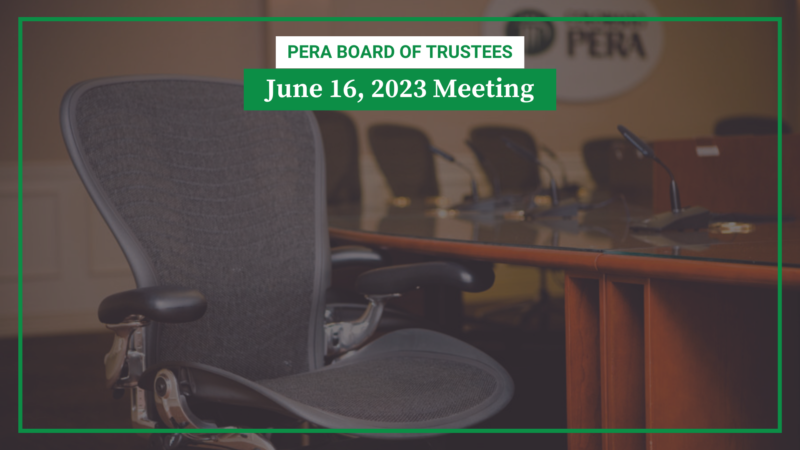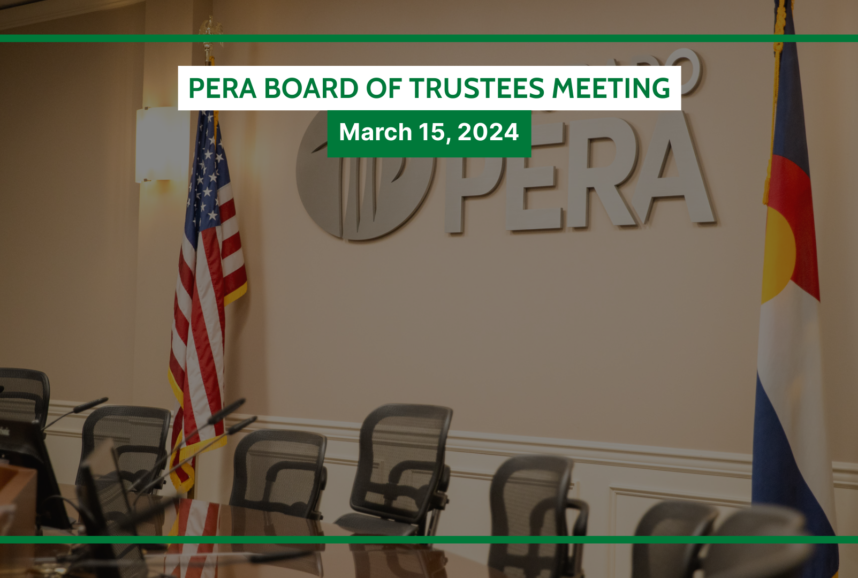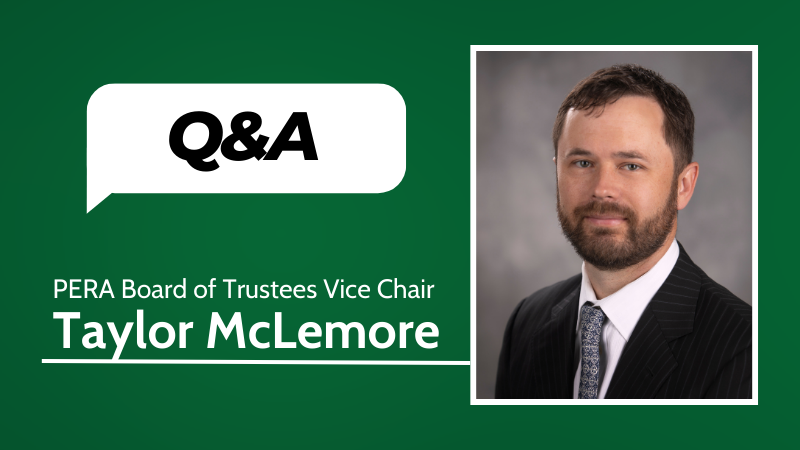The PERA Board of Trustees met on Friday, June 16 to take action on a number of important items, including releasing PERA’s 2022 Annual Report and announcing results of the recent Board election.
Board election
The Board held elections for three open seats this year. One new Trustee was elected to the Board, two Trustees were reelected, and one Trustee was reappointed:
- Eunice Botchway was elected by School Division members
- Trina Ruhland was reelected by Local Government Division members
- Timothy M. O’Brien was reelected by retired members of the State, Local Government, and Judicial Divisions
- Judge Rebecca R. Freyre was reappointed to the Judicial Division seat
Botchway, a special education teacher at Aurora Public Schools, fills a seat currently held by JB Phillips, who was appointed to the Board in 2022. Botchway was elected to a two-year term.
Ruhland, a deputy county attorney with the Boulder County Attorney’s Office, was elected to the seat to which she was appointed in 2022.
O’Brien, the auditor for the City and County of Denver, has served on the PERA Board since 2011.
In addition to the election results, Judge Rebecca R. Freyre was the sole candidate for the Judicial Division seat and was reappointed to the Board in March.
Ruhland, O’Brien, and Freyre will serve four-year terms beginning July 1, 2023.
Learn more about the PERA Board of Trustees at copera.org.
Financial results and Annual Report release
A key action the Board takes every year at its June meeting is receiving the results of its annual actuarial valuations and approving the release of PERA’s Annual Comprehensive Financial Report (ACFR). The 2022 ACFR contains detailed information about PERA’s finances, investment performance, and funded status for the year ended Dec. 31, 2022.
FULL ARTICLE: PERA Board Releases 2022 Annual Report
Legislative update
The Board also received an update on the recently concluded 2023 legislative session. Legislators passed three bills this year that affect PERA, and Gov. Jared Polis has signed all three into law.
One of the bills allocates additional funding to recompense PERA for the state’s missed 2020 direct distribution. Another requires PERA to include a description of climate-related investment risks, impacts and strategies in its annual Investment stewardship Report, and the third bill reclassifies wildlife officers and parks and recreation officers with Colorado Parks and Wildlife as safety officers for determining their PERA benefits.
READ MORE: Colorado Legislators Pass Three PERA-Related Bills During 2023 Legislative Session
The Board also received an update on legislative activity PERA staff will be involved in over the coming months before the next session begins in January. That includes regularly scheduled hearings before the Pension Review Commission, Pension Review Subcommittee, and Legislative Audit Committee this summer, the Joint Budget Committee in the fall, and the Joint Finance Committee in the winter.
In addition, the Board discussed the history of 2018’s Senate Bill 200. That bill, which is now part of state statute, included a number of major reforms that improved PERA’s financial status and established guardrails to ensure PERA is on a path to full funding by the end of 2047. Click here for details.
Executive director search
The Board has begun the process of searching for PERA’s next executive director and is actively seeking an executive search firm to assist in that process. Click here for more information on the Board’s Request for Information from qualified firms.
Throughout this year, the Board has been working to develop its next five-year strategic plan. Since Trustees would like PERA’s next executive director to be involved in that process, the Board decided to extend the existing strategic plan through the end of 2024.
The Board’s next regularly scheduled meeting is the September planning session from Sept. 20 to Sept. 22.
StewardshipThe practice of overseeing or managing something entrusted to one’s care. PERA’s approach to investment stewardship is focused on ensuring the financial sustainability of the fund that pays benefits to retirees and beneficiaries.StewardshipThe practice of overseeing or managing something entrusted to one’s care. PERA’s approach to investment stewardship is focused on ensuring the financial sustainability of the fund that pays benefits to retirees and beneficiaries.Actuarial valuationAn annual assessment of a pension plan’s finances and membership. This forms the backbone of the plan’s annual financial report.





DO PERA BOARD ELECTIONS MATTER?
Sadly, elections don’t make PERA Board & Staff (PERA B.S.) accountable, or they would have fought against benefit cuts, instead they kowtowed to the legislature and governor. Cutting benefits was justified as necessary austerity, but it was caused by deficits of the legislature’s own making.
Lack of a COLA in light of high inflation proves how well the perpetrators of the fraud have succeeded in abusing the victims by repeating cuts are fiscally responsible; but their mantra should be challenged for proof; and show why the legal and traditional solution of increasing worker and employer contributions wasn’t sufficient to address long-term fund solvency years ago. Politicians should be questioned and answer for the impact on civil service in reneging on paying the deferred compensation of promised retirements. It’s laughable that cuts help retirees or will save the program, but it sure helps in selling defined contribution (DC) plans, by contracted vendors, as an alternative to PERA’s defined benefit (DB) plan.* In reality, austerity seems designed to enrich others and hurt the state’s merit-based hiring system. More sinister motives, like greed or an anti-government crusade, may better explain what’s behind cuts than saying, “Opps, there’s not enough money to pay what was promised.” Numerous TABOR refunds over the years belie the state’s claims of poverty, especially since tax increases for pensions aren’t subject to a vote of the electorate under TABOR.
The state’s failure to make appropriate pension contributions caused long-term fund insolvency, but pension fund contributions are still diverted to the general fund because politicians won’t budget within TABOR limits, or demonstrate the intestinal fortitude and leadership to raise taxes when necessary (at least for government pensions, just as TABOR’s backers reckoned would happen). The promise of eventual fund solvency imposed immediate cuts on those with the least amount of time to adjust, but who sacrificed the most so politicians could kick the can down the road (until gone or on to higher office).
Fund managers and private equity firms profit from secret deals and know the score, as do politicians who balance state budgets, and bribe voters with TABOR refunds from revenues that should go for pension fund contributions. Contributions the state and other PERA-covered employers are supposed to make, in sufficient amounts, so as to meet fiscal standards known as actuarially required contributions (ARC). Pretending state revenues or the stock market haven’t recovered from the economic crisis of 2008, or the pandemic, is a sham to extract more from members after years of increased employee contributions, lower benefits, and compounding cuts due to skipped and insufficient annual increases. Yes, when a DB plan is stripped of a COLA, then years without an increase, or insufficient ones, constitute a benefit cut!
It’s not just retirees, but Colorado’s citizens who suffer from PERA benefit cuts because:
1) It’s harder to recruit for state jobs without higher salaries to make up for an unfunded retirement plan, which costs taxpayers more when withheld pension contributions restrict investments used for paying benefits (benefits that need to be good to compete with private sector salaries and compensate for the state NOT covering workers under Social Security);
2) Workers leave service earlier, creating a lack of institutional knowledge and additional hiring costs due to lower retention rates;
3) Decreased spending power, resulting from years of insufficient increases despite high inflation, extend to the communities where pensioners spend their money (and burden state and county public assistance rolls);
4 ) Retirees are stuck with restoring long-term pension fund solvency through benefit cuts because employers shortchange ARC, which delays solvency the longer underfunding continues, e.g., the supplemental annual contribution of $225 million the state promised in 2018, a drop in the bucket to retain a decent credit rating, was viewed as discretionary; and went unpaid until additional legislation passed (costing more due to lost interest and opportunity costs from the delay);
5) Retirees lose common and statutory DB plan “inflation adjustments,” because short-sighted politicians break promises, thus begging the question, “if politicians break promises made to government workers, then what prevents them from pulling a bait and switch on others with respect to taxes, services, private property rights, or other long-term needs?”
In closing, if elected trustees represented DB plan members, they’d lobby for a fair COLA instead of hiding behind the excuse that lawmakers set benefit levels and increases (or the lack thereof). When PERA B.S. asserts they just manage claim processing and investments is a betrayal of their fiduciary duties; because even if they were better at investing it wouldn’t guarantee a COLA, or help fund solvency, as politicians would just steal more; and so, the PERA piggy bank gets raided by diverting money from the ARC to political pet projects and cronies. Remaining silent about underfunding ARC condones undermining the DB plan, and does NOT represent members!
Thanks for reading – and feel free to contact me at handsoffmypera@hotmail.com
_________________________________________________
Footnote * – DC plans reduce the number of participants in the DB plan, under a so-called “Hybrid Plan,” but PERA B.S. should emphasize that DB plans can significantly reduce Social Security benefits that new hires or their survivors would otherwise be entitled (although that may result in demands for higher pay). Regardless, the legislature undoubtedly failed to make additional pension fund contributions to account for fewer DB plan participants, as dismantling civil service requires lowering the number of future participants DB plans (plans which have lured and retained good workers to public service while keeping labor costs low for taxpayers).
Can’t wait to see their response! They always delete mine.
That was an excellent letter to PERA !!!!!!!!!!!!!!
Very well done. Thank you. Every retiree should read this.